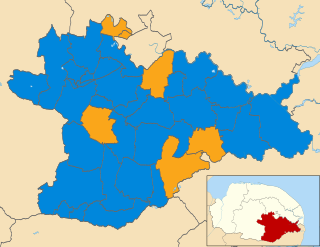
Belfast North is a parliamentary constituency in the United Kingdom House of Commons.

Belfast West is a parliamentary constituency (seat) in the House of Commons of the UK Parliament. It has won by Paul Maskey of Sinn Féin since 2011. In 2017 it ranked the most secure of Northern Ireland's 18 seats by percentage and/or numerical tally of its winning majority, followed by North Down and by North Antrim respectively.

Belfast South is a parliamentary constituency in the United Kingdom House of Commons. It has been represented since 2017 by Emma Little-Pengelly of the Democratic Unionist Party.

Belfast City Council is the local authority with responsibility for part of the city of Belfast, the capital and largest city of Northern Ireland. The Council serves an estimated population of 333,871 (2011), the largest of any district council in Northern Ireland, while also being the fourth smallest by area. Belfast City Council is the primary council of the Belfast Metropolitan Area, a grouping of six district councils with commuter towns and overspill from Belfast, containing a total population of 579,276.
Falls, a division of Belfast, was a UK parliamentary constituency in Ireland. It returned one Member of Parliament (MP) to the House of Commons of the United Kingdom from 1918 to 1922, using the first past the post electoral system.
Shankill, a division of Belfast, was a UK parliamentary constituency in Ireland. It returned one Member of Parliament (MP) to the House of Commons of the United Kingdom to 1918 to 1922, using the first past the post electoral system.
St Anne's, a division of Belfast, was a UK parliamentary constituency in Ireland. It returned one Member of Parliament (MP) to the House of Commons of the United Kingdom from 1918 to 1922, using the first past the post electoral system.
Victoria, a division of Belfast, was a UK parliamentary constituency in Ireland. It returned one Member of Parliament (MP) to the House of Commons of the United Kingdom from 1918 to 1922, using the first past the post electoral system.

Belfast South is a constituency in the Northern Ireland Assembly.

Éirígí (Irish pronunciation: [ˈeːɾʲiːɟiː] or [ˈaɪɾʲiːɟiː], is a socialist republican political party in Ireland, registered since 2010 to contest local elections only. The party name, "Éirígí", means "Arise" or "Rise Up" in the Irish language, a reference to a famous speech by trade union leader James Larkin. Éirígí was formed in 2006 by a group of community and political activists who believed a new political movement was needed to challenge injustice and to build support for a new society and economy anchored in the Republican principles of Liberty, Equality, Democracy, Justice and Community.
For the 19th-century baseball player, see John Lowry (baseball), for the film restorer see John D. Lowry.

Elections for local government were held in Northern Ireland on 15 May 1985, contesting 565 seats in all.

Elections for local government were held in Northern Ireland on Thursday 5 May 2011, contesting 582 seats in all.

The 1920 Irish local elections were held in January & June 1920 for the various county & district councils of Ireland. The elections provide an interesting barometer of opinion in Ireland during the early stages of the Irish War of Independence (1919–21), and were the last elections to be held on an all-Irish basis, with the Government of Ireland Act 1920 being passed at the end of the year, legislating for the partition of Ireland. The next local elections in Ireland were held in Northern Ireland in 1924, with the Irish Free State holding local elections in 1925.

The elections to South Norfolk District Council were held on Thursday 5 May 2011 along with various other local elections around England, elections to the Scottish Parliament, National Assembly of Wales and Northern Ireland Assembly, and a referendum on whether to adopt the Alternative Vote electoral system for elections to the House of Commons. All 46 council seats were up for election. The previous council was controlled by the Conservatives, with the Liberal Democrats being the only opposition.

Máirtín Ó Muilleoir MLA is an Irish Sinn Féin politician, author, publisher and businessman, who served as the 58th Lord Mayor of Belfast (2013–14). Ó Muilleoir has two siblings, one of which is writer, blogger and Huffington Post columnist Adrian Millar, whilst the other is journalist and editor Gerry Millar/Gearóid Ó Muilleoir of The Belfast Telegraph.

Local elections were held in Northern Ireland on Thursday 22 May 2014, contesting 462 seats in all, as part of the wider local elections across the United Kingdom. The election took place on the same day as the European Parliament election.
Robert Lindsay Mason, known as Lindsay Mason, was a unionist politician in Northern Ireland. Known as something of an eccentric, Mason's entire career in politics was spent outside the major unionist parties such as the Ulster Unionist Party and the Democratic Unionist Party.

An election to Belfast Corporation took place in January 1920 as part of that year's Irish local elections. The Local Government (Ireland) Act 1919 had seen elections for local government in Ireland change to a more proportional system. As a result, Unionist dominance of the Belfast council was somewhat undermined, and the party lost 15 seats. In contrast Labour, Sinn Féin, and Nationalist representation grew, resulting in a more politically and socially representative council.

The 1924 Northern Irish local elections were held in January & June 1924 for the various county & district councils of Northern Ireland. The election followed changes by the Unionist government, which had redrawn electoral districts, abolished PR for local elections, and implemented a requirement for members of local authorities to take an oath of allegiance.
















